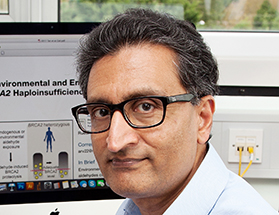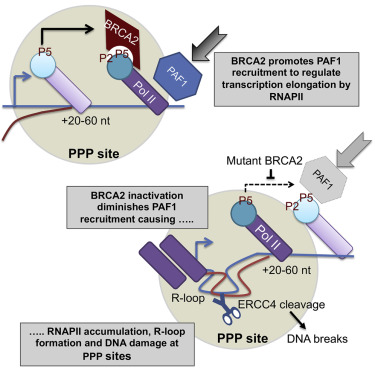
Inheritance of a mutated copy of the breast cancer gene BRCA2 predisposes families to cancers of the breast, ovary, pancreas or prostate at an early age. Despite intensive effort from scientists worldwide, how faults in BRCA2 cause this increased susceptibility to cancer is not well understood.
Most available information suggests that BRCA2 is involved in homologous recombination to repair double strand breaks in DNA, which occurs each time that a cell divides. This DNA repair function is lost in cells with mutant BRCA2, causing DNA mutations to accumulate across the genome, and triggering early-onset of cancer.
Now evidence has emerged that this is not the only way that mutation of BRCA2 leads to cancer. New research, recently published in the journal Cell Reports, by a research team led by Professor Ashok Venkitaraman in the MRC Cancer Unit at the University of Cambridge, has unexpectedly found that BRCA2 safeguards the expression of genes located throughout the human genome, preventing their breakage during the transcription process that precedes the synthesis of new proteins essential for normal cellular function.
The research team has found that BRCA2 safeguards the transcription of DNA into RNA, by coupling to the molecular machinery involved in transcription, and ensuring that it smoothly moves across genes. In cells with mutant BRCA2, the transcription machinery gets held up as its starts, the proximal pause sites, causing accumulation of RNA-DNA duplexes which in turn leads to an increase in double strand breaks and genomic instability and ultimately results in cancer.
These findings not only point to a surprising new way in which the inheritance of mutant BRCA2 may predispose to cancer, but also promises the future development of new treatments that target other proteins associated with the transcription machinery that may allow BRCA2 mutant cancer cells to survive.
















